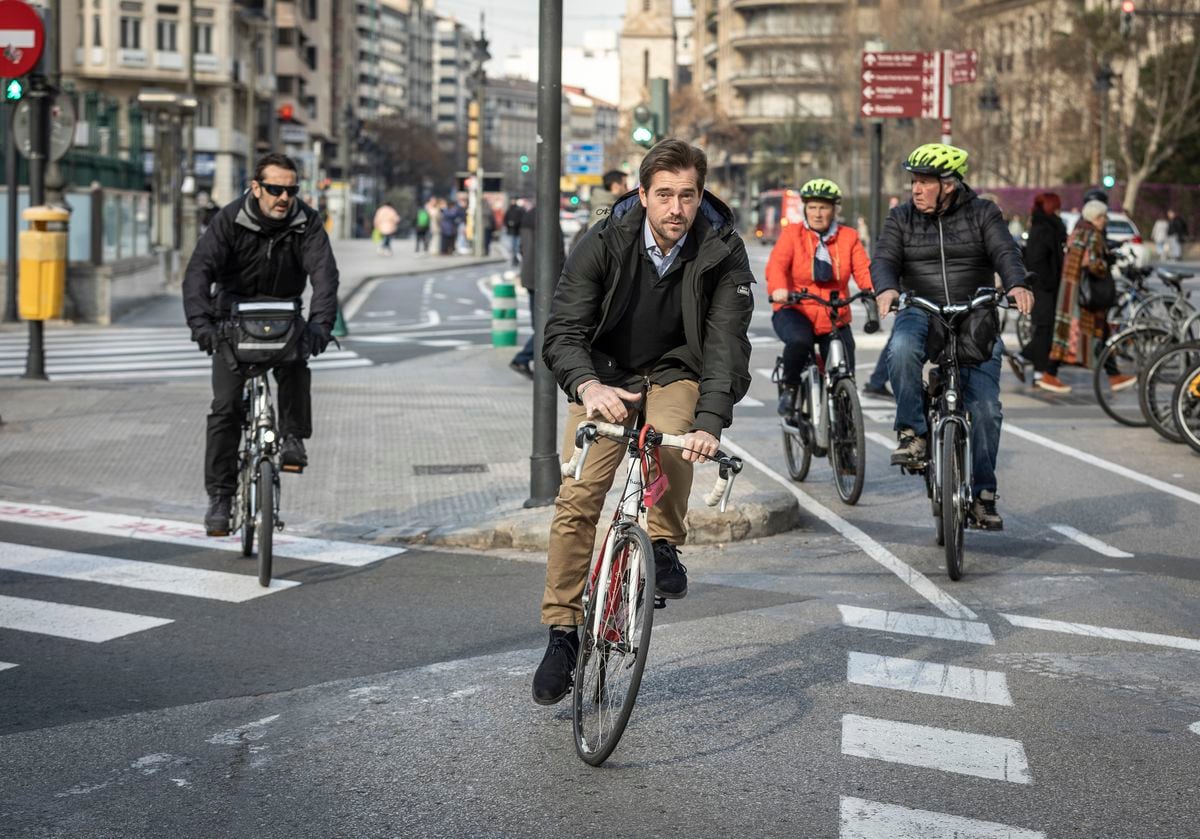Several people go by bicycle to their work in Valencia, this Thursday. Mònica Torres
Going to work by bike every morning is good for your health, for the city (fewer traffic jams), for the environment (less emissions and pollution) and even for the State (which saves health costs).
For this reason, although the most common thing is to subsidize public transport or even give state aid to fuel for cars, several European countries have initiatives underway to pay workers who travel by bicycle: in the Netherlands they have raised the state subsidy this year per kilometer on a velocipede from 19 to 21 cents (the final amount can exceed 1,000 euros per year), while in France the amount can reach up to 800 euros per year.
In Spain,
The Government of the Netherlands subsidizes 21 euro cents for each kilometer traveled by bike between home and work, although it also applies to public transport and car.
This is compensation for the cost of gasoline and public transport that was frozen at 19 cents since 2006 and has just increased this year;
in 2024 it will increase to 23 cents.
This amount is paid by the State through company payrolls and is tax free.
If any company decides to pay more than 21 cents, it must pay taxes for it.
What does it translate to?
Ana Castán is a 40-year-old Spaniard who has lived in Amsterdam for eight years.
“You have to enter in the
company
app how many kilometers you do per week.
You do not have to provide any supporting documents, they trust your word.
And the company pays you the amount at the end of the month together with your payroll, although it is money provided by the State, ”she points out.
“My husband, also Spanish, cycles about 14 kilometers a day, that is, about 3,500 kilometers a year.
So it's more than 700 euros a year”.
With 20 kilometers per day it would be about 1,050 euros per year.
In the case of the self-employed, it works like a tax deduction: "I dedicate myself to doing
tours
by bike around the city and in my case I deduct it from the income statement: in 2020 it was about 1,500 euros ”, continues Castán.
In his opinion, this payment is not essential to convince people to ride, but it helps.
“It also influences that there is a lot of cycling infrastructure to move safely, and that public transport is very expensive.”
More information
The Government's plan to promote the bicycle: learn to use it at school and consider it remuneration at work
France is also committed to helping from the State to employees who commute to work by bicycle and other non-polluting vehicles —such as electric or shared cars.
Companies can voluntarily take advantage of the so-called " durable mobility ski
pass
" (FMD, in French), and pay up to 800 euros per year to each person who uses these modes of transport.
The companies then deduct these amounts from their taxes and social contributions.
In the public sector the amount cannot exceed 300 euros per year.
In addition, the country offers aid to change old cars for electric bicycles, a measure that is not on the table in Spain, according to the ministries of Ecological Transition and Transport.
A man commutes by bike to work in Amsterdam. Romy Arroyo Fernandez (NurPhoto via Getty)
Back in the Netherlands, the Executive is running another initiative, called the Bike Plan, to buy it at a lower price, and with tax benefits, through companies.
It works in the following way: the worker acquires a new bicycle, of any type, and that he can also use in his private life.
He must pay it to his employer through gross salary, with a tax benefit of up to 40%.
In accounting terms, if you choose, for example, an electric model worth 1,000 euros, at the end of the year you save 400 euros in income taxes.
This means that the bike has actually cost 600 euros.
On the other hand, insurance and repairs are tax deductible.
The companies that join the Bike Plan decide how to return the price of the bike and can deduct the cost of the purchase from taxes on their earnings.
Meanwhile, workers who adhere to this type of agreement will see the bonus of 21 cents per kilometer to go to work suppressed.
According to data from the Dutch Executive, 27% of all trips are made by bicycle, and more than half of all trips by car do not reach an average distance of 7.5 kilometres.
Electric bike models, on the other hand, are preferred for these journeys.
It is a measure similar to the one that has been in place since 2019 in the United Kingdom: the Cycle to Work Scheme program includes a series of incentives and tax relief for companies and workers.
Both employer and employee obtain tax deductions and discounts on their Social Security contribution for buying or renting bicycles and safety accessories such as helmets or locks.
It is not, however, a direct subsidy: the rent is part of the worker's gross monthly salary.
The aid is conditional on the fact that at least 50% of the use of the bicycle is destined to go to and from work.
Javier Panizo, 44, has been working in London for 10 years: “You pay what the bike costs out of your gross salary, which saves you up to 40% in taxes.
The first four years the bike belongs to the company, and after four years it is yours.
I have bought two bikes to go to work.
I do about 10 kilometers a day, although I also telework”.
To date, close to 40,000 companies have registered in this scheme, which has enabled 1.6 million people to choose to cycle every working day.
In countries like Belgium, Denmark or Germany there are also programs with incentives for cycling to work.
A change that does not come
In Spain, the State Bicycle Strategy proposes to modify the tax regulations to include cycling to work as income in kind, that is, as part of the salary, something that currently can only be done with the car (when the company provides a
rental
vehicle to the worker as part of his salary).
However, a spokesman for the Ministry of Finance explains that for now there is no regulatory project underway on this issue, nor is it on the table within the Sustainable Mobility Law promoted by the Ministry of Transport.
This rule does include the obligation for large companies (with more than 500 employees or 250 per shift) to draw up sustainable mobility plans to work.
"These plans must include the promotion of active mobility, collective transport, zero-emission mobility...", they point out from Transport.
It does not seem that this is going to translate into a payment for pedaling.
Laura Vergara, spokesperson for the Con Bici coordinator, points out that implementing this aid in companies "requires a state public policy that for now does not seem forthcoming."
A woman pedals along a bike lane in Valencia, last Thursday.
Monica Torres
While it arrives, if it arrives, “cycling entities propose that flexible remuneration for bicycles can be applied, as is already the case with cars.
Until now, there is a 40% discount on the purchase of cars as flexible remuneration, but for now they refuse to enable it for bikes as well”, summarizes Vergara.
Transport defends that "the efficient thing is to encourage the use of the bike", which is why they remember that they have allocated 224 million euros from European Next Generation funds to subsidize town halls so that they build cycling infrastructure and create public bike systems, and others 266 for communities to build and improve bike paths.
With this panorama, the initiative of Liberty Seguros, a pioneer in Spain in paying its employees for cycling to work, is surprising.
“We pay 0.37 cents to our employees for going by bike.
We started in 2016 and since then 109 employees [almost 10% of its 1,200 workers] have been welcomed, to whom between that year and 2020 we paid 85,236 euros to cover some 219,000 kilometers ”, points out a spokeswoman.
However, since March of that year they have opted for 100% teleworking, with which the plan, which is still ongoing, is no longer as popular as in previous years.
With information from
Marc Bassets
(Paris) and
Rafa de Miguel
(London).
You can follow CLIMATE AND ENVIRONMENT on
and
, or sign up here to receive
our weekly newsletter



/cloudfront-eu-central-1.images.arcpublishing.com/prisa/O5KJZWDZ2ZF3PMFCA7GSGYAIW4.jpg)





